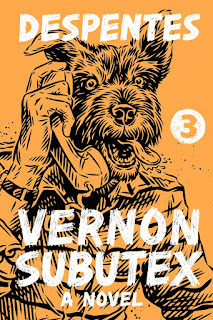Vernon Subutex, by Virginie Despentes, is a chaotic canvas of characters all falling into orbit around a new messiah. Convoluted as life itself.
"Don't worry, I don't want to be a burden, honestly, it doesn't bother me sleeping outdoors." They look at him as though he were insane. Normal. He would have done the same in their shoes. The real truth was that, physically, he could no longer bear to be enclosed by walls and ceilings, he found it difficult to breathe, every object was hostile, and he was plagued by a noxious vibration. The worst thing was having people around him. He could feel their misery, their pain, their fear of not being good enough, of being unmasked, being punished, wasting their lives: he felt it was like pollen, it insinuated its way into every orifice and made it impossible to breath. Which meant that no, he really, truly had absolutely no desire to move in with any of them. These days he needed space. Solitude.
After Vernon's record shop shut down, it wasn't long before he ran out of money. He gives up his worldly possessions (or he stops caring about them), and starts relying on the kindness of strangers and old friends. He has charm, charisma, and good looks, and he spins a mean set of tunes. Overlaid with the aural experiments of a rock star friend recently deceased in possibly suspicious circumstances, the sound waves act like a drug on the masses.
The center of the room was filled with people — the silhouettes had converged and were moving, some slowly, others still entwined, or tracing circles around each other. And then she saw — not with the clarity of a hallucination brought on by acid or shrooms, but even so she saw, and could not claim it was a dream since the illusion lasted long enough for her to be entirely aware of it — light waves surrounding the bodies and she could perceive ribbons of energy, writhing and moving between people. She is a rational person. Unless on drugs, she did not expect to see colored streamers connecting people.
She doesn't like it when people read her cards, she doesn't believe in the supernatural, she's got no time for spells and curses. But here, in the darkness, she could see things that did not exist. And the most unsettling thing is that she did not deliberate, did not decide to get up — she simply found herself on her feet, hands in the air, an idiot smile plastered to her face. She was dancing. And although she was not touching anyone, not brushing up against another body, she recognized the feeling — she was orgasming. It had nothing to do with sex and yet this was the most incredible fuck she'd ever had in her life.
Over three volumes clocking in at nearly 1,000 pages, this was an engrossing read. Despentes is often compared to bad boy Michel Houellebecq; maybe I'm inured to provocation on the grounds of that holy trifecta of sex, religion and politics, but I don't see it. Despentes's characters are messy and offbeat, but they feel real. I'm not sure if there needs to be a social commentary underlying this thick slab of life; it's simply exuberant.
I just read and kept reading, way past my bedtime.
The brain of a person with irrational goals has greater depth of field than one that functions normally, it's always several steps ahead, it anticipates everything. It's the same thing with alcohol. Even when Véro wants to stop drinking, she knows that her brain will manage to get her into situations that leave her no option, and generally this happens unbeknownst to her own free will — in other words, she does not decide to drink, she remembers she needs to call an old friend going through a hard time, and once she is at his place, she realizes that what she really comes for is a dozen shots of pastis. The brain is devious: it plays tricks on your consciousness, it does things on the sly, that way you get exactly what you wanted while pretending you were thinking about something else entirely.
While Vernon Subutex is no lyrical masterpiece (neither is War and Peace), it holds both beauty ("She is resilient and fragile, and there is something about the tension between these things that makes her overwhelming.") and truth ("You don't batter the mother of your kids because she did something wrong. You do it because you're violent.").
Check out Jennifer Croft's take on Volume 1 with a particular eye on the quality of the translation (Croft translates Olga Tokarczuk):
Part of what makes this book so exciting to read is Despentes's ability to broach so many topics, toggling between them in seamless, almost superhuman fashion. Deftly she tackles sex, materialism, the technologies that are hastening society’s collapse, capitalism, racism, gender fluidity, wounded masculinity, wounded femininity, domestic violence, homelessness, porn, the hypocrisy of the left, and the virulence of the right. Vernon Subutex 1 is about all these things, but it is also about Paris — the people living in the city today, and in particular, those who don’t change when society changes around them.
Excerpts
from Volume 1
from Volume 2
from Volume 3
He does not say what he is thinking. He is thinking that no one is solid. Nothing. No group. That it is the hardest thing to learn. That we are tenants of a situation, not landlords.















